#i have a love/hate relationship with horror that overlooks how much power the narrative gives humanity
Text
every now and then there’s a yt horror story that goes along the lines of “cosmic eldtrich horror is discovered/revealed. humanity defeats and contains it for “research”. then the narrative tries to convince the audience that the deity is the overpowered one
bro
humanity just bitch slapped a deity and u want me to worry about the deity’s unchecked powers???
#horror#scary stories#retrospect#i have a love/hate relationship with horror that overlooks how much power the narrative gives humanity#humanity can only inflict so much damage on a deity before i question who's really top dog in that universe#the scp foundation does a good job of keeping 21st century humanity humble imo#there's deity scps that cant be contained and the most the foundation does is spectate it
9 notes
·
View notes
Text
My Top 20 Films of 2019 - Part Two
I don’t think I’ve had a year where my top ten jostled and shifted as much as this one did - these really are the best of the best and my personal favourites of 2019.
10. Toy Story 4
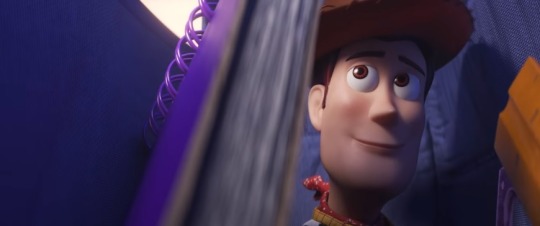
I think we can all agree that Toy Story 3 was a pretty much perfect conclusion to a perfect trilogy right? About as close as is likely to get, I’m sure. I shared the same trepidation when part four was announced, especially after some underwhelming sequels like Finding Dory and Cars 3 (though I do have a lot of time for Monsters University and Incredibles 2). So maybe it’s because the odds were so stacked against this being good but I thought it was wonderful. A truly existential nightmare of an epilogue that does away with Andy (and mostly kids altogether) to focus on the dreams and desires of the toys themselves - separate from their ‘duties’ as playthings to biological Gods. What is their purpose in life without an owner? Can they be their own person and carve their own path? In the case of breakout new character Forky (Tony Hale), what IS life? Big big questions for a cash grab kids films huh?
The animation is somehow yet another huge leap forward (that opening rainstorm!), Bo Peep’s return is excellently pitched and the series tradition of being unnervingly horrifying is back as well thanks to those creepy ventriloquist dolls! Keanu Reeves continues his ‘Keanuassaince‘ as the hilarious Duke Caboom and this time, hopefully, the ending at least feels finite. This series means so much to me: I think the first movie is possibly the tightest, most perfect script ever written, the third is one of my favourites of the decade and growing up with the franchise (I was 9 when the first came out, 13 for part two, 24 for part three and now 32 for this one), these characters are like old friends so of course it was great to see them again. All this film had to do was be good enough to justify its existence and while there are certainly those out there that don’t believe this one managed it, I think the fact that it went as far as it did showed that Pixar are still capable of pushing boundaries and exploring infinity and beyond when they really put their minds to it.
9. The Nightingale

Hoo boy. Already controversial with talk of mass walkouts (I witnessed a few when this screened at Sundance London), it’s not hard to see why but easy to understand. Jennifer Kent (The Babadook) is a truly fearless filmmaker following up her acclaimed suburban horror movie come grief allegory with a period revenge tale set in the Tasmanian wilderness during British colonial rule in the early 1800s. It’s rare to see the British depicted with the monstrous brutality for which they were known in the distant colonies and this unflinching drama sorely needed an Australian voice behind the camera to do it justice.
The film is front loaded with some genuinely upsetting, nasty scenes of cruel violence but its uncensored brutality and the almost casual nature of its depiction is entirely the point - this was normalised behaviour over there and by treating it so matter of factly, it doesn’t slip into gratuitous ‘movie violence’. It is what it is. And what it is is hard to watch. If anything, as Kent has often stated, it’s still toned down from the actual atrocities that occurred so it’s a delicate balance that I think Kent more than understands. Quoting from an excellent Vanity Fair interview she did about how she directs, Kent said “I think audiences have become very anaesthetised to violence on screen and it’s something I find disturbing... People say ‘these scenes are so shocking and disturbing’. Of course they are. We need to feel that. When we become so removed from violence on screen, this is a very irresponsible thing. So I wanted to put us right within the frame with that person experiencing the loss of everything they hold dear”.
Aisling Franciosi is next level here as a woman who has her whole life torn from her, leaving her as nothing but a raging husk out for vengeance. It would be so easy to fall into odd couple tropes once she teams up with reluctant native tracker Billy (an equally impressive newcomer, Baykali Ganambarr) but the film continues to stay true to the harsh racism of the era, unafraid to depict our heroine - our point of sympathy - as horrendously racist towards her own ally. Their partnership is not easily solidified but that makes it all the stronger when they star to trust each other. Sam Claflin is also career best here, weaponizing his usual charm into dangerous menace and even after cementing himself as the year’s most evil villain, he can still draw out the humanity in such a broken and corrupt man.
Gorgeously shot in the Academy ratio, the forest landscape here is oppressive and claustrophobic. Kent also steps back into her horror roots with some mesmerising, skin crawling dream scenes that amplify the woozy nightmarish tone and overbearing sense of dread. Once seen, never forgotten, this is not going to be everyone’s cup of tea (and that’s fine) but when cinema can affect you on such a visceral level and be this powerful, reflective and honest about our own past, it’s hard to ignore. Stunning.
8. The Irishman

Aka Martin Scorsese’s magnum opus, I did manage to see this one in a cinema before the Netflix drop and absolutely loved it. I’ve watched 85 minute long movies that felt longer than this - Marty’s mastery of pace, energy and knowing when to let things play out in agonising detail is second to none. This epic tale of the life of Frank Sheeran (Robert De Niro) really is the cinematic equivalent of having your cake and eating it too, allowing Scorsese to run through a greatest hits victory lap of mobster set pieces, alpha male arguments, a decades spanning life story and one (last?) truly great Joe Pesci performance before simply letting the story... continue... to a natural, depressing and tragic ending, reflecting the emptiness of a life built on violence and crime.
For a film this long, it’s impressive how much the smallest details make the biggest impacts. A stammering phone call from a man emotionally incapable of offering any sort of condolence. The cold refusal of forgiveness from a once loving daughter. A simple mirroring of a bowl of cereal or a door left slightly ajar. These are the parts of life that haunt us all and it’s what we notice the most in a deliberately lengthy biopic that shows how much these things matter when everything else is said and done. The violence explodes in sudden, sharp bursts, often capping off unbearably tense sequences filled with the everyday (a car ride, a conversation about fish, ice cream...) and this contrast between the whizz bang of classic Scorsese and the contemplative nature of Silence era Scorsese is what makes this film feel like such an accomplishment. De Niro is FINALLY back but it’s the memorably against type role for Pesci and an invigorated Al Pacino who steals this one, along with a roll call of fantastic cameos, with perhaps the most screentime given to the wonderfully petty Stephen Graham as Tony Pro, not to mention Anna Paquin’s near silent performance which says more than possibly anyone else.
Yes, the CG de-aging is misguided at best, distracting at worst (I never really knew how old anyone was meant to be at any given time... which is kinda a problem) but like how you get used to it really quickly when it’s used well, here I kinda got past it being bad in an equally fast amount of time and just went with it. Would it have been a different beast had they cast younger actors to play them in the past? Undoubtedly. But if this gives us over three hours of Hollywood’s finest giving it their all for the last real time together, then that’s a compromise I can live with.
7. The Last Black Man in San Francisco

Wow. I was in love with this film from the moving first trailer but then the film itself surpassed all expectations. This is a true indie film success story, with lead actor Jimmie Fails developing the idea with director Joe Talbot for years before Kickstarting a proof of concept and eventually getting into Sundance with short film American Paradise, which led to the backing of this debut feature through Plan B and A24. The deeply personal and poetic drama follows a fictionalised version of Jimmie, trying to buy back an old Victorian town house he claims was built by his grandfather, in an act of rebellion against the increasingly gentrified San Francisco that both he and director Talbot call home.
The film is many things - a story of male friendship, of solidarity within our community, of how our cities can change right from underneath us - it moves to the beat of it’s own drum, with painterly cinematography full of gorgeous autumnal colours and my favourite score of the year from Emile Mosseri. The performances, mostly by newcomers or locals outside of brilliant turns from Jonathan Majors, Danny Glover and Thora Birch, are wonderful and the whole thing is such a beautiful love letter to the city that it makes you ache for a strong sense of place in your own home, even if your relationship with it is fractured or strained. As Jimmie says, “you’re not allowed to hate it unless you love it”.
For me, last year’s Blindspotting (my favourite film of the year) tackled gentrification within California more succinctly but this much more lyrical piece of work ebbs and flows through a number of themes like identity, family, memory and time. It’s a big film living inside a small, personal one and it is not to be overlooked.
6. Little Women

I had neither read the book nor seen any prior adaptation of Louisa May Alcott’s 1868 novel so to me, this is by default the definitive telling of this story. If from what I hear, the non linear structure is Greta Gerwig’s addition, then it’s a total slam dunk. It works so well in breaking up the narrative and by jumping from past to present, her screenplay highlights certain moments and decisions with a palpable sense of irony, emotional weight or knowing wink. Getting to see a statement made with sincere conviction and then paid off within seconds, can be both a joy and a surefire recipe for tears. Whether it’s the devastating contrast between scenes centred around Beth’s illness or the juxtaposition of character’s attitudes to one another, it’s a massive triumph. Watching Amy angrily tell Laurie how she’s been in love with him all her life and then cutting back to her childishly making a plaster cast of her foot for him (’to remind him how small her feet are’) is so funny.
Gerwig and her impeccable cast bring an electric energy to the period setting, capturing the big, messy realities of family life with a mix of overwhelming cross-chatter and the smallest of intimate gestures. It’s a testament to the film that every sister feels fully serviced and represented, from Beth’s quiet strength to Amy’s unforgivable sibling rivalry. Chris Cooper’s turn as a stoic man suffering almost imperceptible grief is a personal heartbreaking favourite.
The book’s (I’m assuming) most sweeping romantic statements are wonderfully delivered, full of urgent passion and relatable heartache, from Marmie’s (Laura Dern) “I’m angry nearly every day of my life” moment to Jo’s (Saoirse Ronan) painful defiance of feminine attributes not being enough to cure her loneliness. The sheer amount of heart and warmth in this is just remarkable and I can easily see it being a film I return to again and again.
5. Booksmart
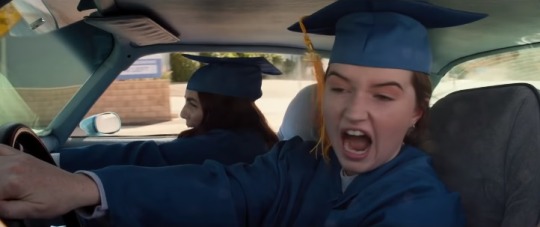
2019 has been a banner year for female directors, making their exclusion from some of the early awards conversations all the more damning. From this list alone, we have Lulu Wang, Jennifer Kent and Greta Gerwig. Not to mention Lorene Scafaria (Hustlers), Melina Matsoukas (Queen & Slim), Jocelyn DeBoer & Dawn Luebbe (Greener Grass), Sophie Hyde (Animals) and Rose Glass (Saint Maud - watch out for THIS one in 2020, it’s brilliant). Perhaps the most natural transition from in front of to behind the camera has been made by Olivia Wilde, who has created a borderline perfect teen comedy that can make you laugh till you cry, cry till you laugh and everything in-between.
Subverting the (usually male focused) ‘one last party before college’ tropes that fuel the likes of Superbad and it’s many inferior imitators, Booksmart follows two overachievers who, rather than go on a coming of age journey to get some booze or get laid, simply want to indulge in an insane night of teenage freedom after realising that all of the ‘cool kids’ who they assumed were dropouts, also managed to get a place in all of the big universities. It’s a subtly clever remix of an old favourite from the get go but the committed performances from Kaitlyn Dever and Beanie Feldstein put you firmly in their shoes for the whole ride.
It’s a genuine blast, with big laughs and a bigger heart, portraying a supportive female friendship that doesn’t rely on hokey contrivances to tear them apart, meaning that when certain repressed feelings do come to the surface, the fallout is heartbreaking. As I stated in a twitter rave after first seeing it back in May, every single character, no matter how much they might appear to be simply representing a stock role or genre trope, gets their moment to be humanised. This is an impeccably cast ensemble of young unknowns who constantly surprise and the script is a marvel - a watertight structure without a beat out of place, callbacks and payoffs to throwaway gags circle back to be hugely important and most of all, the approach taken to sexuality and representation feels so natural. I really think it is destined to be looked back on and represent 2019 the way Heathers does ‘88, Clueless ‘95 or Easy A 2010. A new high benchmark for crowd pleasing, indie comedy - teen or otherwise.
4. Ad Astra
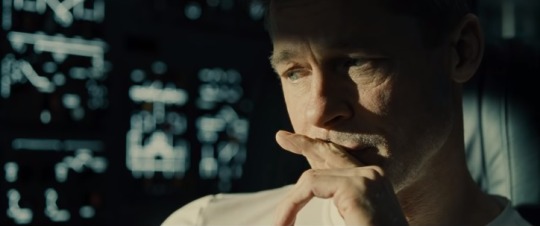
Brad Pitt is one of my favourite actors and one who, despite still being a huge A-lister even after 30 years in the game, never seems to get enough credit for the choices he makes, the movies he stars in and also the range of stories he helps produce through his company, Plan B. 2019 was something of a comeback year for Pitt as an actor with the insanely measured and controlled lead performance seen here in Ad Astra and the more charismatic and chaotic supporting role in Once Upon a Time... in Hollywood.
I love space movies, especially those that are more about broken people blasting themselves into the unknown to search for answers within themselves... which manages to sum up a lot of recent output in this weirdly specific sub-genre. First Man was a devastating look at grief characterised by a man who would rather go to a desolate rock than have to confront what he lost, all while being packaged as a heroic biopic with a stunning score. Gravity and The Martian both find their protagonists forced to rely on their own cunning and ingenuity to survive and Interstellar looked at the lengths we go to for those we love left behind. Smaller, arty character studies like High Life or Moon are also astounding. All of this is to say that Ad Astra takes these concepts and runs with them, challenging Pitt to cross the solar system to talk some sense into his long thought dead father (Tommy Lee Jones). But within all the ‘sad dad’ stuff, there’s another film in here just daring you to try and second guess it - one that kicks things off with a terrifying free fall from space, gives us a Mad Max style buggy chase on the moon and sidesteps into horror for one particular set-piece involving a rabid baboon in zero G! It manages to feel so completely nuts, so episodic in structure, that I understand why a lot of people were turned off - feeling that the overall film was too scattershot to land the drama or too pondering to have any fun with. I get the criticisms but for me, both elements worked in tandem, propelling Pitt on this (assumed) one way journey at a crazy pace whilst sitting back and languishing in the ‘bigger themes’ more associated with a Malik or Kubrick film. Something that Pitt can sell me on in his sleep by this point.
I loved the visuals from cinematographer Hoyte van Hoytema (Interstellar), loved the imagination and flair of the script from director James Gray and Ethan Gross and loved the score by Max Richter (with Lorne Balfe and Nils Frahm) but most of all, loved Pitt, proving that sometimes a lot less, is a lot more. The sting of hearing the one thing he surely knew (but hoped he wouldn’t) be destined to hear from his absent father, acted almost entirely in his eyes during a third act confrontation, summed up the movie’s brilliance for me - so much so that I can forgive some of the more outlandish ‘Mr Hyde’ moments of this thing’s alter ego... like, say, riding a piece of damaged hull like a surfboard through a meteor debris field!
3. Avengers: Endgame
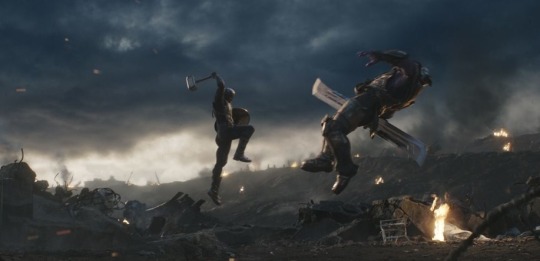
It’s no secret that I think Marvel, the MCU in particular, have been going from strength to strength in recent years, slowly but surely taking bigger risks with filmmakers (the bonkers Taika Waititi, the indie darlings of Ryan Coogler, Cate Shortland and Chloe Zhao) whilst also carefully crafting an entertaining, interconnected universe of characters and stories. But what is the point of building up any movie ‘universe’ if you’re not going to pay it off and Endgame is perhaps the strongest conclusion to eleven years of movie sequels that fans could have possibly hoped for.
Going into this thing, the hype was off the charts (and for good reason, with it now being the highest grossing film of all time) but I remember souring on the first entry of this two-parter, Infinity War, during the time between initial release and Endgame’s premiere. That film had a game-changing climax, killing off half the heroes (and indeed the universe’s population) and letting the credits role on the villain having achieved his ultimate goal. It was daring, especially for a mammoth summer blockbuster but obviously, we all knew the deaths would never be permanent, especially with so many already-announced sequels for now ‘dusted’ characters. However, it wasn’t just the feeling that everything would inevitably be alright in the end. For me, the characters themselves felt hugely under-serviced, with arguably the franchise’s main goody two shoes Captain America being little more than a beardy bloke who showed up to fight a little bit. Basically what I’m getting at is that I felt Endgame, perhaps emboldened by the giant runtime, managed to not only address these character slights but ALSO managed to deliver the most action packed, comic booky, ‘bashing your toys together’ final fight as well.
It’s a film of three parts, each pretty much broken up into one hour sections. There’s the genuinely new and interesting initial section following our heroes dealing with the fact that they lost... and it stuck. Thor angrily kills Thanos within the first fifteen minutes but it’s a meaningless action by this point - empty revenge. Cutting to five years later, we get to see how defeat has affected them, for better or worse, trying to come to terms with grief and acceptance. Cap tries to help the everyman, Black Widow is out leading an intergalactic mop up squad and Thor is wallowing in a depressive black hole. It’s a shocking and vibrantly compelling deconstruction of the whole superhero thing and it gives the actors some real meat to chew on, especially Robert Downy Jr here who goes from being utterly broken to fighting within himself to do the right thing despite now having a daughter he doesn’t want to lose too. Part two is the trip down memory lane, fan service-y time heist which is possibly the most fun section of any of these movies, paying tribute to the franchise’s past whilst teetering on a knife’s edge trying to pull off a genuine ‘mission impossible’. And then it explodes into the extended finale which pays everyone off, demonstrates some brilliantly imaginative action and sticks the landing better than it had any right to. In a year which saw the ending of a handful of massive geek properties, from Game of Thrones to Star Wars, it’s a miracle even one of them got it right at all. That Endgame managed to get it SO right is an extraordinary accomplishment and if anything, I think Marvel may have shot themselves in the foot as it’s hard to imagine anything they can give us in the future having the intense emotional weight and momentum of this huge finale.
2. Knives Out

Rian Johnson has been having a ball leaping into genre sandpits and stirring shit up, from his teen spin on noir in Brick to his quirky con man caper with The Brothers Bloom, his time travel thriller Looper and even his approach to the Star Wars mythos in The Last Jedi. Turning his attention to the relatively dead ‘whodunnit’ genre, Knives Out is a perfect example of how to celebrate everything that excites you about a genre whilst weaponizing it’s tropes against your audience’s baggage and preconceptions.
An impeccable cast have the time of their lives here, revelling in playing self obsessed narcissists who scramble to punt the blame around when the family’s patriarch, a successful crime novelist (Christopher Plummer), winds up dead. Of course there’s something fishy going on so Daniel Craig’s brilliantly dry southern detective Benoit Blanc is called in to investigate.There are plenty of standouts here, from Don Johnson’s ignorant alpha wannabe Richard to Michael Shannon’s ferocious eldest son Walt to Chris Evan’s sweater wearing jock Ransom, full of unchecked, white privilege swagger. But the surprise was the wholly sympathetic, meek, vomit prone Marta, played brilliantly by Ana de Armas, cast against her usual type of sultry bombshell (Knock Knock, Blade Runner 2049), to spearhead the biggest shake up of the genre conventions. To go into more detail would begin to tread into spoiler territory but by flipping the audience’s engagement with the detective, we’re suddenly on the receiving end of the scrutiny and the tension derived from this switcheroo is genius and opens up the second act of the story immensely.
The whole thing is so lovingly crafted and the script is one of the tightest I’ve seen in years. The amount of setup and payoff here is staggering and never not hugely satisfying, especially as it heads into it’s final stretch. It really gives you some hope that you could have such a dense, plotty, character driven idea for a story and that it could survive the transition from page to screen intact and for the finished product to work as well as it does. I really hope Johnson returns to tell another Benoit Blanc mystery and judging by the roaring box office success (currently over $200 million worldwide for a non IP original), I certainly believe he will.
1. Eighth Grade

My film of the year is another example of the power of cinema to put us in other people’s shoes and to discover the traits, fears, joys and insecurities that we all share irregardless. It may shock you to learn this but I have never been a 13 year old teenage girl trying to get by in the modern world of social media peer pressure and ‘influencer’ culture whilst crippled with personal anxiety. My school days almost literally could not have looked more different than this (less Instagram, more POGs) and yet, this is a film about struggling with oneself, with loneliness, with wanting more but not knowing how to get it without changing yourself and the careless way we treat those with our best interests at heart in our selfish attempt to impress peers and fit in. That is understandable. That is universal. And as I’m sure I’ve said a bunch of times in this list, movies that present the most specific worldview whilst tapping into universal themes are the ones that inevitably resonate the most.
Youtuber and comedian Bo Burnham has crafted an impeccable debut feature, somehow portraying a generation of teens at least a couple of generations below his own, with such laser focused insight and intimate detail. It’s no accident that this film has often been called a sort of social-horror, with cringe levels off the charts and recognisable trappings of anxiety and depression in every frame. The film’s style services this feeling at every turn, from it’s long takes and nauseous handheld camerawork to the sensory overload in it’s score (take a bow Anna Meredith) and the naturalistic performances from all involved. Burnham struck gold when he found Elsie Fisher, delivering the most painful and effortlessly real portrayal of a tweenager in crisis as Kayla. The way she glances around skittishly, the way she is completely lost in her phone, the way she talks, even the way she breathes all feeds into the illusion - the film is oftentimes less a studio style teen comedy and more a fly on the wall documentary.
This is a film that could have coasted on being a distant, social media based cousin to more standard fare like Sex Drive or Superbad or even Easy A but it goes much deeper, unafraid to let you lower your guard and suddenly hit you with the most terrifying scene of casually attempted sexual aggression or let you watch this pure, kindhearted girl falter and question herself in ways she shouldn’t even have to worry about. And at it’s core, there is another beautiful father/daughter relationship, with Josh Hamilton stuck on the outside looking in, desperate to help Kayla with every fibre of his being but knowing there are certain things she has to figure out for herself. It absolutely had me and their scene around a backyard campfire is one of the year’s most touching.
This is a truly remarkable film that I think everyone should seek out but I’m especially excited for all the actual teenage girls who will get to watch this and feel seen. This isn’t about the popular kid, it isn’t about the dork who hangs out with his or her own band of misfits. This is about the true loner, that person trying everything to get noticed and still ending up invisible, that person trying to connect through the most disconnected means there is - the internet - and everything that comes with it. Learning that the version of yourself you ‘portray’ on a Youtube channel may act like they have all the answers but if you’re kidding yourself then how do you grow?
When I saw this in the cinema, I watched a mother take her seat with her two daughters, aged probably at around nine and twelve. Possibly a touch young for this, I thought, and I admit I cringed a bit on their behalf during some very adult trailers but in the end, I’m glad their mum decided they were mature enough to see this because a) they had a total blast and b) life simply IS R rated for the most part, especially during our school years, and those girls being able to see someone like Kayla have her story told on the big screen felt like a huge win. I honestly can’t wait to see what Burnham or Fisher decide to do next. 2019 has absolutely been their year... and it’s been a hell of a year.
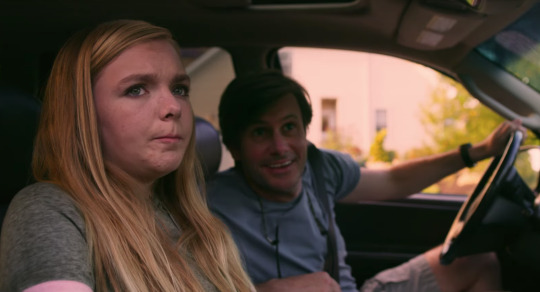
#top 20#films of the year#films of 2019#10-1#toy story 4#the nightingale#the irishman#the last black man in san francisco#little women#booksmart#ad astra#avengers endgame#knives out#eighth grade
77 notes
·
View notes
Text
My Top Performances of 2019, Part 2
Here is the second half of the list of my favorite film performances of 2019. I tried to be as objective as possible, but it’s also a result of personal preferences. As before, the order is unimportant.
Part 1 is here: https://ryanmeft.tumblr.com/post/190668845597/my-top-performances-of-2019-part-1?fbclid=IwAR3_d80vj0FbIVXqWaTV1heUlIDJJmL-JB_ZksaadO_oNRztnhBMICxzTd8

Zhao Tao in Ash is Purest White
She’s got everything you could want in a rusting former industrial town: a good boyfriend who has influence in the area’s small underworld, which gives her power, love and money all at once. In a blink it is all gone, and she finds herself adrift in the world, dealing with the resentments of people with no patience for what she has gone through. Tao is the key component of this crime drama, which is more drama than crime. She does not take the world in blazing force as a crime figure in a Scorsese film might do, but quietly and slowly accepts that the days of her power are past---and unlike the men around her, tries to adapt to, rather than battle, the inevitable.
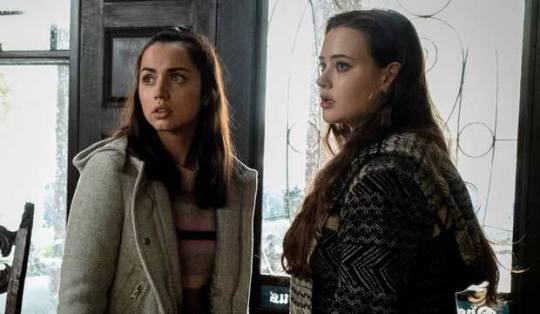
Ana De Armas in Knives Out
Knives Out is in the grand, disappearing tradition of the character actor, albeit with the parts mostly played by superstars. Yet among a roster that includes Captain America as an irresponsible playboy and Michael Shannon as a professorial-looking semi-Nazi, De Armas’s humble heroine Marta stands out. Maybe it’s because Marta is humble but not naive or entirely innocent, and De Armas manages to capture both her cunning and her honesty without turning her into a doe-eyed victim. She’s the kind of character you want to become a Nancy Drew-esque mystery hero for adults, so you can revisit her later adventures.
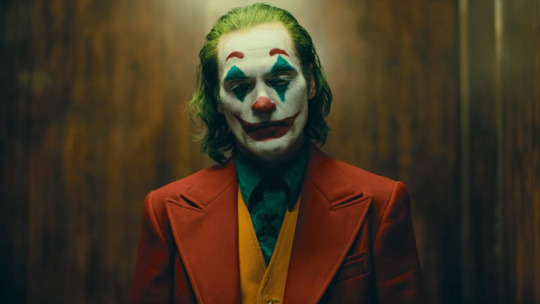
Joaquin Phoenix in Joker
Some hated the movie, some loved it, but one thing it seems everyone could agree on is Phoenix’s performance. He’s credited as Arthur Fleck, not as Joker, and his handling of the character couldn’t be more different than any previous portrayal. Arthur is sad and lonely, not at all an enigma---his private life is laid out for us in great detail---and Phoenix portrays him as just sort of being blown through the world, bereft of any real agency. You can debate all day whether the character deserves to be portrayed in a sympathetic way, but you can’t say Phoenix doesn’t pull it off, making us root for this maladjusted, societally-forgotten misfit almost up ‘till the end.

Sienna Miller in American Woman
In a just world, Miller, hardly a household name, would have her face up on the stage Sunday night for playing this role, a drunken, hard-partying too-young mother and grandmother whose life begins to change when her daughter disappears. I say begins to, because this is not one of those magical stories of miraculous redemption. Debra does not become a good parent to her grandchild right away, and never becomes a great one. Instead, the film follows her throughout years of her life, during which, naturally, she must go on living as she mourns. Miller embodies each stage of this perfectly, never once allowing drama tropes to disturb her unflinching portrayal of an ordinary life.
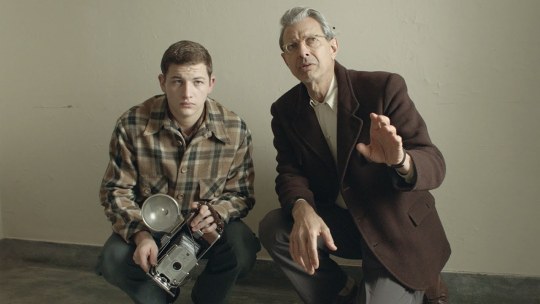
Jeff Goldblum in The Mountain
What does the word “monster” conjure for you? Whatever traits it brings to mind, they are all present in Dr. Wallace Fiennes. He’s an egotistical, self-interested, callous man who performs lobotomies on mental patients in the 1950’s American heartland, the kind of person for whom his gruesome practice is not an outmoded method to be improved on by advancement, but an art form in itself, and his patients merely the canvas. This isn’t handled like a horror movie: Goldblum is not a mad scientist cackling away in a lab, but an urbane, cultured, engaging professional---which makes him all the more frightening.

Gugu Mbatha-Raw in Fast Color
Wonder Woman and Captain Marvel were, to a large extent, a marketing department’s ideal female superheroes: always flawless, gorgeous even when kicking ass, unable to make any very serious mistakes. Ruth is very much not that. She’s living wherever she can, dealing with the effects of past addictions, running from the government, scared of her own powers. She’s not just unlike any other woman in tights (without the tights), she’s unlike any mainstream superhero ever has, can or will be. Mbatha-Raw is one of our most underrated actresses, and she portrays Ruth in a way that allows us to both sympathize with her plight and support her as she grows stronger. The movie’s not getting a sequel, because the Hollywood franchise machine isn’t ready for imperfect superheroes yet, but it is getting a series, so at least we’re getting more of Ruth in some medium.
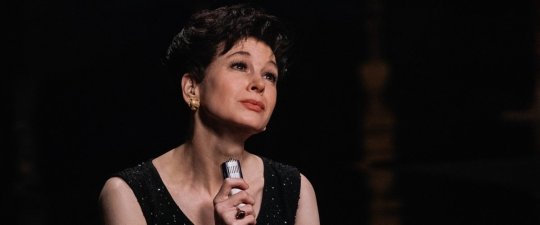
Renee Zellweger in Judy
I won’t pretend I knew much about Judy Garland going in, and frankly I’m not sure I understand her after seeing the movie---it was, in most respects, a fairly typical music biopic. Where it broke the mode is in Zellweger’s performance. I think it’s fair to say the once-household name has been largely forgotten by Hollywood in recent years; she never had the perfect starlet looks or the ideal girl-next-door adorableness that is the main standard on which women are judged. But she had the acting chops, and here she finally gets to prove it. Her Garland is twisted and gnarled inside and out by years of sexist treatment and the resulting substance abuse, but still a loving mother to her children and a great singer---and justifiably angry at the industry that used her up and spit her out.

Paul Walter Hauser in Richard Jewell
There was never a single chance of seeing the camera pan to Hauser during Sunday’s roll call of acting nominees---both he and the person he plays are about the polar opposite of Hollywood’s image of itself. And it must be said that while Jewell should not be forgotten, Eastwood’s movie, with its ginned-up anti-press narrative, maybe should be. But none of that is on Hauser, whose performance firmly proves that fat guys can be more than bumbling comedic relief or ineffective sidekicks in the movies. It matters that someone who looks like Jewell is portraying him, and that he does it so well that we can almost overlook the film’s other faults.
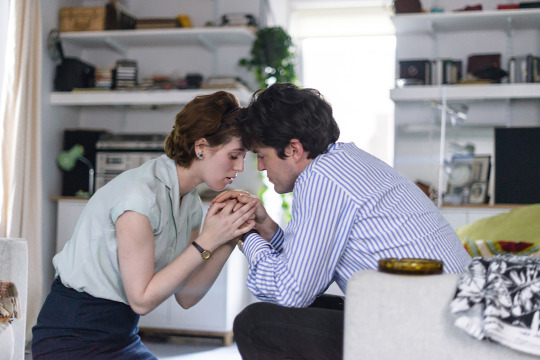
Honor Swinton Byrne in The Souvenir
This one was little-seen, and though it generated awards buzz initially, it’s already been largely forgotten. That’s too bad. Byrne’s Julie is a woman torn between her own ambitions and her love for a man who is---abusive? How to judge him? It’s a toxic relationship fueled by addiction on his part, but the movie is more about how you cope with a partner who is committed but not capable of commitment. Perhaps the most resonant aspect of Julie’s character is the way she holds out hope even when everyone tells her not to, even when she herself knows deep down that it is hopeless. You may find this weak, but I’ve never known a human being who wasn’t in some measure susceptible to it.

Jonathan Pryce and Anthony Hopkins in The Two Popes Everyone has strong feelings about the Catholic Church---it’s not a thing you go half-measures on. And every Catholic has strong feelings about the last two Popes---again, they aren’t the kind of personalities that inspire milquetoast reactions. What Pryce and Hopkins do in portraying Francis and Benedict, respectfully, is remind us that no matter how much they claim to be the chosen of God, these are after all two men---two men with flaws and opinions, whose own lives have shaped them every bit as much as the Bible or the church. When they are on screen together, you can imagine them in an odd couple buddy comedy, two aging road trippers tending to the flock. Lots of performances didn’t make my arbitrary 20-point cutoff. To be dead honest with you, it’s entirely possible that if you ask me in a year, I’ll have re-considered who is on the main list and who is in the honorable mentions; the idea that what I say now, when all these movies are fresh in my mind and affected by immediate emotional reaction, has to be my inviolate opinion for all time is silly.
That said, here are some excellent and noteworthy performances that didn’t quite make the cut.
Leonardo DiCaprio and Brad Pitt in Once Upon a Time in Hollywood
Kelvin Harrison, Jr. in Waves
Zack Gottsagen in The Peanut Butter Falcon
Isabela Moner in Dora and the Lost City of Gold
Alessandro Nivola in The Art of Self-Defense
Cate Blanchett in Where’d You Go, Bernadette?
More or less everyone in Little Women (I couldn’t decide, and thought more of the acting than the overall film)
Jodie Turner-Smith in Queen and Slim
Cynthia Erivo in Harriet
Kaitlyn Dever in Booksmart
Edward Norton in Motherless Brooklyn
#Joaquin Phoenix#ana de armas#renee zellweger#jeff goldblum#movies#jonathan pryce#anthony hopkins#leonardo dicaprio#brad pitt#once upon a time in hollywood#Quentin Tarantino#judy garland#knives out#rian johnson#cate blanchett#richard linklater#the peanut butter falcon#zack gottsagen#isabela moner#dora and the lost city of gold#Alessandro Nivola#the art of self-defense#kelvin harrison jr.#waves#little women#jodie turner-smith#queen and slim#cynthia erivo#harriet#Edward Norton
30 notes
·
View notes
Note
Ships: Spuffy, Bangel, Xanya, Cole/Phoebe, Piper/Leo, Prue/Andy, Suliet, Skate, Jate, Jacket
Wow, that’s a lot of ships! Thanks so much for sending them in! I actually love writing about this stuff so the more the merrier :) I’ve tried to keep this as short as I could, but due to the number of ships it did get a little long, so I’ll put the rest under the cut.
Some warnings before you read: anti-Spuffy, anti-Xanya, anti-Pleo and anti-Skate (not really, but I do criticise these ships and so it’s better safe than sorry).
Spuffy
It’s perfect timing for me to write about Spuffy because I’ve just recently done a Buffy re-watch, so their relationship is fresh in my mind. When it comes to Buffy and Spike, I’m actually pretty neutral about their relationship. I’m not a hardcore shipper but I’m also not anti Spuffy either. It’s always a relief when there’s two opposing ships (in this case Spuffy and Bangel) and you’re able to enjoy both (although I do prefer Bangel).
Before I get into actually talking about the relationship itself, I want to say that I do think that Buffy and Spike’s relationship was quite forced. It’s clear to me that when Spike was first introduced onto the show there weren’t any plans to make him a main character and put him into a relationship with Buffy. Generally speaking, it doesn’t even make sense that Spike survives until season 7 since Buffy has absolutely no reason to keep him around. He’s a vampire without a soul and Buffy is the Slayer, she kills Spike’s kind every single day without blinking. The only exception to that is Angel because he has a soul, so it doesn’t make sense that Buffy just allows Spike to hang around Sunnydale. It becomes more complicated when he has the chip because technically he can’t harm anyone and he starts to prove useful, but even then it’s hard to understand why Buffy doesn’t kill him. Spike getting his soul at the end of season 6 is also forced, because narratively it makes no sense. Angel is a unique, one-of-a-kind vampire who was cursed with a soul as punishment. No vampire (whether they are in love or not, which is a topic of debate because can soulless vampires even love?) would voluntarily seek out their soul. It’s a heavy burden to bear after centuries as a vampire and I don’t buy that Spike would want to do this. Also, Spike’s entire character is build on this idea of him being a one-of-a-kind soulless vampire that is capable of showing a lot of human emotion and whose behaviours and perceptions change as a result of the chip, so giving him a soul kind of detracts from that. Overall, I feel that Spike getting a soul was only written because Whedon decided he wanted to continue pursuing the Spuffy romance but realised after season 6 that he couldn’t logically do that until Spike had a soul. As a result, the Spuffy relationship doesn’t make sense from a narrative stand-point. Spike was an antagonist that should’ve left the show or been killed off at some point during season 3, but his character was so popular and well-liked that Whedon wanted to find a way to write him in permanently and developing a romance with Buffy was the most feasible way of doing that.
Putting that aside, in seasons 1-4 I enjoy Spuffy’s dynamic and the way they bicker at each other immensely. Buffy and Spike as individual characters have bags of personality and when they come together they’re always entertaining and they draw me in. In season 5 their relationship enters a new phase when Spike develops a crush on Buffy. The thing is with the Spuffy relationship in general is that you have to take it at face value. In my opinion, it is not a “serious” relationship and certainly not feasible as a long-term relationship, because of the nature of it. However, it’s a fascinating ship that explores the complexities of mental health and toxic relationships, and how the two can overlap and feed one another.
Spike’s feelings for Buffy develop out of a dark and twisted obsession whereby he gets off on the fact that Buffy’s his nemesis, that she’s strong and fierce and violent towards him. His obsession for her becomes so strong that he consistently stalks her (which is common amongst vampires, who are naturally predatory creatures) and forces Warren to build him a Buffybot. The Buffybot alone represents everything wrong with their relationship. Spike creates a sex doll that looks exactly like Buffy that will be his slave; that’s so unhealthy and is unacceptable on every level. However, it’s perfectly aligned with Spike’s behaviour and urges as a soulless vampire. I see all this stuff about how Spike with a soul still wasn’t that bad but I think it’s overlooked that he still had naturally dark tendencies and instincts as a vampire. He didn’t seek out Buffy because he wanted a loving, committed relationship with someone who was his equal, he sought her out because he enjoyed the “rough and tumble” and was fascinated with the apparent “darkness” and “death” he saw in Buffy and got a kick out of being the one to push her to that dark place. When their sexual relationship develops, it’s as unhealthy as Spike’s crush has been up until that point, because it evolves out of Buffy’s depression which Spike actively encourages. Instead of supporting Buffy through her depression, he feeds it by telling her she no longer belongs with her friends and that she belongs with him in the “shadows”. It’s a very toxic and unhealthy relationship for both Buffy and Spike. Although Spike doesn’t have a soul, it’s emotionally distressing for him to endure the treatment he gets from Buffy. She actively goes to him and sleeps with him but then discards him and tears him down and refuses to acknowledge him as a human being (which is fair since he’s technically not). It’s very harmful to Buffy who carries the immense guilt and shame of her feelings and how she’s behaving. Plus, as I mentioned above, it feeds her depression and self-destructive behaviour. But like I said, you have to take Spuffy at face value and I can’t criticise the ship for any of this. It’s actually what I like about them. They’re supposed to be dark and twisted, they’re supposed to be bad for each other, they’re supposed to push each other to the deepest darkest corners of what they’re capable of and that’s exactly what they do.
In reality, Spuffy’s relationship is a complex metaphor for the human psyche. Spike is symbolically the monster inside Buffy and when she uses and abuses him she’s punishing herself. Spike is Buffy’s way of self-destructing, of trying to emotionally make sense of the hollowness she feels inside. Spike allows it and revels in it because he’s a creature of darkness and death. What he experiences with Buffy is normal to him as a vampire. He loved Drusilla as truly as a soulless vampire can love, but it was a very dark and twisted love whereby they did terrible things with and to each other and got pleasure and enjoyment out of that. Spike tries to pursue a similar relationship with Buffy, but the problem is that it doesn’t work because Buffy is human. She’s not physically, emotionally or mentally capable of engaging in the type of relationship or behaviours Spike expects or enjoys without it having a profound negative impact on her.
It’s probably an unpopular opinion coming from a Bangel shipper, but I actually really like the way Spuffy are written up until season 7. Even the dreaded attempted rape scene from Seeing Red (which is still to this day one of the most controversial and debated scenes from any fandom I’m part of) makes sense in the context of the relationship. I respect Whedon for writing that in, because as hard as it was to film for SMG and James, and how horrific, upsetting and controversial it is, it feels like a natural culmination of their relationship and the path its on in season 6. It shows how wrong that relationship is and it’s a reminder that regardless of how different Spike may seem from other soulless vampires, he is still a vampire without a soul. Whether you love him or hate him, it’s a clear statement that he is a monster and that’s very important to establish and to remember. It also reinforces what we’re told and shown throughout the season, which is that Buffy cannot love him because he’s a monster. That one line she says, “Ask me again why I could never love you” is such an incredibly powerful one and despite the horror of the scene, it’s probably one of my favourites because of how much is conveyed with just one sentence.
Moving on from their relationship in season 6 (because I could discuss it all night), the fact that I like the way Spuffy are written in season 6 is why I don’t like the way they are written in season 7. Everything about the relationship in season 7 feels forced and inorganic. It isn’t a progression of their relationship from season 6, it’s like Whedon hit the reset button and tried to rewrite them as a fresh new ship without the weight of their history. The problem is, in doing that he fundamentally changes what Buffy and Spike are. Spike getting a soul could never change the fact that Buffy is incapable of loving him. Buffy has told Spike that he’s beneath her, she’s called him a thing, told him numerous times she cannot and will never love him and the nature of their relationship in season 6 only reaffirms those feelings she has. Buffy doesn’t have any positive feelings towards Spike in seasons 1-6, and getting a soul doesn’t magically fix or change that. From my perception, the person Spike fundamentally is isn’t someone that Buffy could love. Even if she’d met him as a human, she would never look twice at him. So Buffy’s characterisation has to be sacrificed in season 7 in order for her relationship with Spike to develop. The Buffy Summers I know and love would never pursue a romantic relationship with Spike soul or no soul and it doesn’t matter how much I appreciate their dynamic in seasons 1-6, I can’t get past that and as a result I can’t enjoy them in season 7 because it doesn’t fit with how I perceive those characters and their relationship.
This has got incredibly long, so I’ll wrap it up by saying that I enjoy and appreciate Spuffy in seasons 1-6, because I accept them for what they are. In season 6, it’s unhealthy, it’s destructive and it’s toxic, but it’s also a push and pull dynamic. I don’t perceive just Buffy OR Spike to be the victim in that relationship, they are both victims (excluding Seeing Red, where Buffy is obviously the only victim). It’s an important relationship in exploring Buffy’s mental state in season 6 and season 6 wouldn’t be what it is without Spike and Spuffy.
Bangel
I already shared my opinion on Bangel before, you can read it here.
Xanya
I really don’t have any opinions on this ship, I’m completely indifferent to them. They don’t stand out to me as being a particularly special ship in terms of their chemistry or story, but I also don’t dislike them. I personally still think that Xander was gay and that Whedon should’ve pursued that path with him because it would’ve made more sense, but he chose to write Willow as the gay character instead and god forbid we have more than one LGBT character from the main ensemble cast *gasp*
Cole/Phoebe
I really like Phoebe and Cole as a ship (you can read more of my opinions on them here and here) and think that over the years people have jumped on the bandwagon about how “toxic” and bad for each other they were, but they actually had a lot of positive qualities. Phoebe and Cole had great chemistry and passion, they were very well matched and their love endured so much. They were star-crossed lovers that were mortal enemies but that fell in love with each other and fought tooth and nail to make their relationship work. Their relationship is proof that the age old cliche of “love conquers all” is simply not true. Phoebe and Cole were deeply in love but their love wasn’t enough and no matter how many times they tried or how long and hard they clung onto each other, they couldn’t make it work. What I like about their relationship is that it carries an important message that we don’t always end up with the person who is the love of our life. There’s an expectation that most of us have that we will find the love of our life and be with them until the day we (or they) die, but in many instances that’s not the case. Phoebe and Cole are a testament to that and prove that even if the relationship doesn’t last, the love two people share is still important and will always stay with them. Piper/Leo
I’ve briefly discussed Piper and Leo before here, but I’ll go into more detail. Surprisingly, I’m not a very big Pleo shipper. I like them but I just don’t buy into them as the epic true love story that they’re sold to us as being. Generally, Leo as a character is rather one-dimensional and I think that Piper could’ve had a much better love interest. Leo is defined by his “goodness” as a Whiteligher and although his arc takes a darker twist in season 6, it rarely strays from that narrative. Over the years as I’ve gotten older I’ve noticed the complete lack of development they have and when Piper has her big realisation that she’s in love with Leo in Love Hurts, it’s not very earned. Throughout season 1 Piper is attracted to Leo, they have a few interactions and sleep together, but he’s not really that significant in her life. Piper barely knows anything about him other than the fact that he’s a handyman and there’s not much of a basis there for her to fall in love with him. In season 2, when the whole love triangle comes into play with Leo and Dan, it makes even less sense because Dan actually makes much more sense as a love interest for Piper. He’s “normal” (Piper talks often about how she craves for normality in her life), he’s reliable, he’s present in her daily life, he’s sweet, considerate, romantic and attractive. All of the problems that Piper has in her relationship with Leo - him being magical and his prolonged absences - directly contrast Dan. Dan doesn’t pose any of those problems, so the question is why does Piper love Leo more than Dan?
I suppose this issue taps into a fundamental aspect of the Piper and Leo relationship that they’re destined and soul mates. When it comes to destiny and soul mates, it’s hard to then argue that a couple is underdeveloped, because their connection is routed in a cosmic bonding of souls which is difficult to quantify. And despite their lack of development in seasons 1 and 2, I do buy into them being soul mates as the seasons progress. The way in which they consistently find their way back to each other and overcome obstacles to be with each other solidifies them as being soul mates. I particularly like their relationship in seasons 4 and 5 when they’re at their strongest and most united.
However, as I mentioned in the post I’ve linked above, I have a lot of issues with the way they were ripped apart at the end of season 5 in Oh My Goddess. That whole plot felt incredibly forced to me and I would’ve much preferred that Piper and Leo were able to stay together for the remainder of the series without some ridiculous obstacle being thrown in their way just for the sake of it. By that point they’d already had to overcome Leo being a Whitelighter, the love triangle with Dan, getting the Elders to accept their romance and having a baby. It was hardly a smooth ride for them and to rip them apart when Wyatt was still so young was particularly cruel and unfair. Although they tried to get the relationship back on track and re-establish them, it never felt quite right to me after that. I love the love scene between them in The Courtship of Wyatt’s Father, but everything else about the way their relationship is written in season 6 is awful. Piper hiding her pregnancy from Leo is incredibly OOC for her and Leo being a neglectful father is also very OOC. I appreciate that in season 7 their relationship is quite representative of the rough patches that a lot of long-term relationships go through and that they’re basically “on the rocks”, but I still don’t like how they’re written. The whole season is basically Piper babysitting Leo and worrying about him non-stop, up until The Seven Year Witch, which I’ll admit is one of the most romantic episodes for Piper and Leo and finally gets their relationship back on track.
Overall, I like Piper and Leo together, but I don’t love them together. I think their love endured a lot and that ultimately they were soul mates, but I also think that their relationship didn’t really start to be anything particularly special until around season 3. Therefore, the writers could’ve ended her relationship with Leo in season 1 and I wouldn’t have been shocked and thought, “But hold on, Leo was the love of Piper’s life he needs to come back”, because I just don’t think they had the development at that stage for him to be considered so important (despite what the writing tells us very early on). The sisters could’ve got a new Whitelighter from season 2 onwards (which would’ve been a good opportunity to bring fresh blood onto the show) and Piper could’ve had another long-term love interest whether it be Dan or someone entirely new, and I could’ve bought that as much as I buy into Piper and Leo.
Prue/Andy I’ve spoken about Prue and Andy before here and I don’t really have much more to add. I think they’ve a very underrated ship that had a lot of potential. They were incredibly well matched and I believe that Paige and Henry’s relationship in season 8 provides insight into the kind of relationship Prue and Andy could’ve had if they had both survived. Suliet
I’ve shared my feelings about Suliet already here. I don’t have much more to add than what I’ve already said in my previous post, except I absolutely adore Sawyer and Juliet as a ship. It’s a rare thing to be able to convey so much depth and emotion in such a short time-span, but the LOST writers pulled it off perfectly. Their relationship is the perfect culmination of their character development and two unlikely people coming together results in the most beautiful relationship. It’s sad that we don’t get more flashbacks of their time in Dharmaville and the earlier days of their relationship, but nonetheless, what we are given was beautiful. Their reunion scene in the Flash Sideways is still one of my all time favourite LOST scenes. The emotion and connection in that scene captures everything that they are and confirms that they’re soul mates, which is particularly poetic since Juliet walks way from him in season 5 because she thinks they’re not meant to be together. How wrong was she? #soulmates #meanttobe Skate
I’ve spoken quite in-depth about Skate previously, here and here. I appreciate and enjoy their dynamic, but from my perspective the romantic aspect of it was always very one-sided. They made more sense to me as friends and I understood them as friends. I think they were just too similar to work in a relationship and like I said with Spuffy above, I always felt that there was something deeply ingrained in Kate that prevented her from ever being able to love Sawyer in a romantic sense. She definitely loved him and at certain points she had romantic feelings for him, but it was never strong enough; it was never secure or absolute. That’s the reason they never worked as a couple because even when she tried to be with him, she was never fully there. But that’s because she was always in love with Jack, which brings me nicely onto the next ship.Jate
My recent LOST re-watch reminded me how much I actually like Jack and Kate as a pairing. I’ve always shipped them but I’ve never been particularly hardcore for them (my favourite LOST ship has always been Suliet or Demond and Penny), but I really noticed on my re-watch how much they loved each other. What’s great about it though is that it’s not a very in-your-face relationship. If you’ve only watched the show once or haven’t watched it in a while it’s easy to build up this perception in your head that it’s very Jack-Kate centric, but it’s not really. It is very Jack-Kate centric in regards to the attention their individual characters get and the amount of scenes they have together, but the actual romantic aspect of their relationship doesn’t get much focus. It’s obvious that they’re in love, but it’s just built into the natural dynamic they have with each other. Primarily when they’re on the island they’re friends and partners who are each other’s constant source of support. They’re fiercely loyal to each other and that aspect of their relationship is easy to overlook, but every single time one of them makes a decision the other is there backing them up, even if they might not always necessarily think it’s the right decision. They’re always a team and they work together and trust each other implicitly. With any ship there’s the whole “I’ll do anything for you” mantra that we all feel when we’re in love, but with Jack and Kate you see that all the time. They will literally do anything for each other. No matter what life or death situation they’re in, they will always go back for each other if one of them is left behind (this is why I have slight issues with the last season, because Kate leaving Jack behind to die is very OOC and generally the two of them being separated for most of their time on the island doesn’t make sense). Despite how manipulative Kate can be, they’re equals and I think what initially draws them to each other is the strength they see in each other. From the second they meet on the island they see each other’s determination and sheer will in getting off the island and protecting everybody. Kate spends her life on the run, hiding who she is from the world, but with Jack he just sees her and her spirit. Even when he finds out about her crimes, he never really needs her to explain because he accepts her for who she is and trusts that what he sees of her is exactly who she truly is. It’s such a well-crafted slow burn relationship that is established from the pilot and is consistently built upon until the final episode. Everything that happens between them feels earned because of that time and attention that’s given to establishing them. From the second they walk into each other’s lives they bond and that bond is unbreakable. It just makes me sad, that just like with Suliet, we didn’t get enough scenes of them being a normal, happy couple. But the scenes we do get are well selected and perfectly encapsulate everything they’re about as a couple.
Jacket
Can I just say first of all, that this ship name is quite comical? All I picture is a denim jacket when I see this haha. It’s good that I get to speak about Jack and Juliet actually, because my re-watch made me see them in a different light. In the past I was always “eh” about Jack and Juliet. I never really understood why it was written for it to then just be erased before it even had chance to develop. However, my eyes have been opened to the immense potential this ship had. The thing is with the Jack-Kate-Sawyer-Juliet love square, is the writers really could’ve chosen to go in any direction with the pairings and it would’ve worked - we got Jack/Kate and Sawyer/Juliet and that worked, we could’ve had Kate/Sawyer and Jack/Juliet and that would’ve worked and we even could’ve had Jack/Sawyer and Kate/Juliet, god knows the chemistry and tension was there to make it work!
Jack and Juliet are generally overlooked and forgotten as a pairing because of how fast they were brushed off, but they had great development. In a way, Jack and Juliet’s relationship starts off as a kind of Stockholm Syndrome; Jack is a prisoner and Juliet is the captor. Juliet knows everything about Jack and purposefully uses clever emotional manipulation to get the desired outcome from him. Jack knows this, he knows that she’s playing him and that she’s acting on behalf of Ben who is dictating to her what to do, yet he develops a complex emotional bond with her because of the kindness she shows him and the fact that she’s the only human companionship he gets. When you’re locked up in a cell with no human contact and nothing to do, all you have to look forward to is the person who’s visiting you everyday to bring food. Jack falls into a routine with Juliet where he goes and sits against the wall when she enters and he brings her sandwiches with toothpicks (notice how this becomes a sort of weird connection between them which they both make reference to later on as they become friends). Jack is naturally a very good judge of character; he’s able to read people and situations very well and from the get go his instincts tell him that Juliet is a good person. Very early on he’s able to distinguish between her and the rest of the Others, even before he builds up complete trust in her, he still senses that she’s the most reliable and that she may actually help him escape.
But it’s not just Jack that builds a bond with Juliet. Juliet also builds one with Jack. We know from flashbacks that Juliet has had a rather lonely existence on the island. She’s been separated from her sister, the most profound connection she has in her life, and the one bond she establishes on the island - with Goodwin - is taken away from her by Ben. Ben’s obsession with Juliet leads him to purposefully isolate her and as a result she’s very lonely. When she meets Jack she is sent in by Ben to manipulate him, but she looks at Jack and sees herself - a prisoner. Juliet may not physically be in a cell, but it doesn’t mean she’s any less of a prisoner. From the beginning she sees Jack as a ray of hope, a comrade and someone that she could possibly escape with and find a new life with.
Much like Jack and Kate, Jack and Juliet’s bond is instant, but slowly develops over time due to the complicated circumstances they find themselves under. Juliet does what she can to protect Jack and likewise Jack does what he can to protect Juliet. They develop an implicit understanding and trust that leads them to depend on one another. And when they realise that their main goal is the same - to escape Ben - they also become allies. It’s actually a fascinating way for a relationship to develop and based on other shows I’ve seen it’s unique too.
Putting aside the circumstances of how they meet and how their relationship develops, as people Jack and Juliet are very suited. They’re both healers and spend their lives saving lives (or giving life in Juliet’s case), they’re both medical marvels who accomplish seemingly impossible tasks (Jack performing miraculous spine surgery and Juliet making infertile women pregnant) they’re loyal, intelligent and determined. And when they come together there’s an ease and familiarity between them whereby it seems like they’ve known each other for a long time. I also didn’t really notice before, but they also have pretty great chemistry (you can particularly see it in the following scenes (x) (x) (x) go to 2:45 on the last one).
Of course, none of this matters because no matter how beautifully developed their relationship was, Jack was in love with Kate since season 1 and no matter how he felt about Juliet it would never compare to that. It’s sad in a way, because like I said at the beginning, Jack and Juliet had a lot of potential. But I do think that there was that ultimate spark missing between them. They had chemistry but it was never quite the same as the chemistry Jack had with Kate or Juliet had with Sawyer. Jack and Juliet’s relationship feels like that very “safe” relationship that people enter into because they’re too scared to get their heart broken by someone they truly love that ignites passion and excitement and all of that other dangerous and exciting stuff in them. Like Juliet said to Kate in season 4, Jack kissing her was just him trying to prove to himself that he didn’t love Kate. Jack was just scared of taking the plunge with Kate because he knew she could really hurt him. So in that respect, they never would’ve worked. Jack and Kate were set up as the endgame ship in the pilot and everybody knew that. Nonetheless, I still appreciate Jack and Juliet’s dynamic and friendship, and think that although it didn’t develop into something romantic there was always an undercurrent of something more between them.
#answered#my meta#sophygurl#i love you sm for sending these in#writing meta's has become one of my fave things on here
10 notes
·
View notes
Text
Winter 2018 Anime Overview: Devilman Crybaby and The Ancient Magus Bride
(the weird symbols in place of punctuation will go away if you click on read more. sorry I cannot fix them).
It’s that time of the season! Time to look back on the anime I watched over the Winter 2018 season and give my thoughts on them. We’ve got at least five anime to get through here. l start out with the two that gave me the most conflicted feelings.
Devilman Crybaby

Devilman Crybaby is a 10-episode anime adaptation of Go Nagai’s 70s manga Devilman, revamped for a modern audience. It was released all at once on Netflix. The story follows a young man named Akira Fudo, a Nice Young Man (tm). His childhood friend Ryo gets him involved in hunting demons and he ends up merging with one! He becomes Devilman, a demon who retains his good human heart. With Ryo at his side, he vows to use his powers for justice and fight the bad demons.
I...watched this for some reason, and I pretty much already did a review (beware spoilers) and covered my thoughts on it in my liveblog. I didn’t come out exactly a fan of the show overall, but it was an interesting experience at least. I had a fun time looking into the weird history of the franchise and with all the memes. Devilman Crybaby is based on a old, influential manga and there’s a good breakdown of some of the smart adaptation choices the series made here. Probably the thing that a lot of people in my circle talking about it the most is it’s EXTREMELY queer, and while the representation is a mixed bag to say the least, it makes an effort.
Overvall, there’s some cool concepts and arcs in this series, such as the the depictions of Satan and God.There’s also some neat animation and aesthetics, but plotwise it’s uneven with the first half being very weak in the pacing department and the characters were not explored as much as I’d like.
There’s also a lot of badly handled and salaciously framed sexual assault junk as well as gross, exploitative framing of women’s bodies while mens’ bodies are largely left alone. The tired way it deals with sexuality is really boring and standard when you get down to it, rather than “shocking” like it tries to be.
What i really got out of it was I will keep the doomed queer lady couple and carry them in my heart along with the other gay stuff and I will laugh at how Extra Ryo is forever, but in the long run, not much else is memorable and will stick with me.
The Ancient Magus Bride (Episodes 14-22)
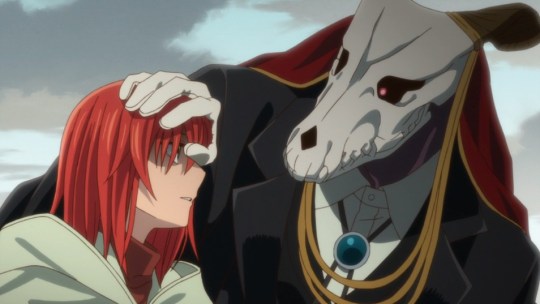
Read my review of the first half of the Ancient Magus Bride here!
Hoo boy. There is a lot to unpack with this one. I am going to get pretty detailed with my analysis here, so major spoilers. The TLDR version is: good stuff with Chise’s mom, bad ending episode, read the manga.
Let’s start with the good. We see Chise grow a lot as a character during this second half of the series and there’s a really nice focus on her forming friendships with girls closer to her age. The series shows her building a life outside Elias for herself and she becomes more self-possessed. She and Elias have a lot to teach each other, and they have some refreshingly honest conversations.
The series also doesn’t shy away from depicting Chise’s trauma and shows her grappling with it a lot.. She still places a very low value on herself and feels guilty for relying on others, and Elias calls her out on that. She’s taking steps forward, slowly. Episode 22, probably the strongest episode of the series, deals with the issues she has with her mother and her backstory and there are a ton of cool things there
Chise’s mother attracted monsters in a way similar to Chise does, and when her husband abandoned her, she struggled to both support and protect herself and Chise. It was near impossible task considering all the things trying to kill them and her desperation eventually led to a complete breakdown, where she tried to strangle Chise and lessen her burden. When she snapped out of it, she was so horrified at what she’d done, she committed suicide.
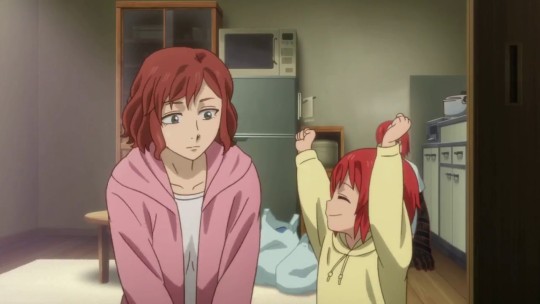
Chise takes a deep dive into her memories and comes to the realization the “mother” that has haunted her all this time was a version of her mother she herself constructed in her head based on her mother’s worst moment, a mother who wants her dead. But her mother didn’t actually want that in the end, otherwise she wouldn’t have let go of Chise or hated herself for what she did. Her mother, like any human, was not just one emotion or one moment, she was a fragile and flawed person who really did care for Chise before she broke down. Chise recognizes that now.
But, and this is the key, and what really made this episode work for me: Chise explicitly does not forgive her mother. Her mother is complex and more than just that one act, but that doesn’t mean that one act can be overlooked, or is any less scarring for Chise. She crossed a line that cannot be uncrossed, and Chise doesn’t have to forgive that to move on. Her mother abandoned her and now she has a new life. She chooses not to let her mothers actions define her.

I really enjoyed that. It’s true the images we construct in our heads are different from the real people we interact with, who are more complex, and the way this episode explores that is cool. One important moment can define the version of that person we keep in our hearts. And this episodes message that you can recognize someone who abused you as a complex and even pitiful person and still not forgive them. The most important thing is to move forward. A lot of stories wouldn’t have handled this sequence that deftly. The narrative sympathizes with Chise’s mother, but it doesn’t excuse her and neither does Chise herself.
But hey, speaking of abuse and narratives glossing over it! Let’s talk about Elias.

So you know all those female friendships Chise’s having and how she’s like, getting a life outside Elias? Elias is not okay with that. In fact, he’s SO possessiv he threatens Chise’s life at one point- she has to threaten to hurt herself to get him to stop squeezing her. It’s pointed out that Elias is like a child, which is true enough- he’s very new to feelings and interacting with people. But the excuse “oh it’s because he’s like a child” is eerily reminiscent of how abusers are excused in real life- “he can’t control himself, he’s just throwing tantrums”. Abusers are often babied in this way.
The idea Chise is obligated to “mother” him and teach him basic morality and self control even at risk to herself is a dangerous one. Nobody should be expected to do that, much less a traumatized teen. Yet Chise instantly forgives Elias for nearly killing her, when she clearly needs to get out of this relationship before she is harmed more, because this behavior can only worsen.
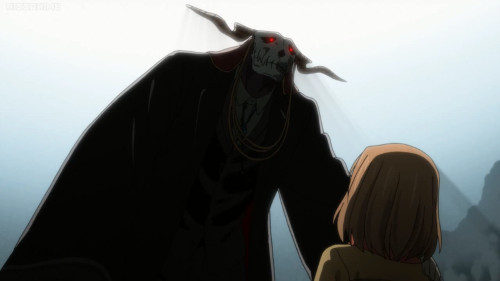
And I actually don’t have a problem with this for most of the narrative- because it’s not romanticized It is clearly a mistake that Chise indulges Elias’s behavior because, realistically, it escalates.
Chise’s days are numbered thanks to a curse and he promises Chise he’ll work with her to solve the problem. But he goes back on his word and tries to sacrifice another human to save Chise. He even goes so far as to make Chise faint to keep her from interfering, utterly denying her agency. And the kicker is he chooses to kill the a little girl Chise has befriended for this, explicitly because he’s jealous that Chise “looks at her” differently that she does him. He is literally so possessive he’s willing to kill children Chise dares pay any attention to.
it’s unbelievably fucked up, and the narrative treats it as such. It also make it clear this is the natural result of how toxic this relationship has gotten. Chise arrives in time to stop Elias and her sheer horror and rage is very powerfully done. For the first time, she sees him for how selfish and dangerous he is, how much he doesn’t respect her wishes and their relationship is broken. In a powerful (and satisfying) moment, she slugs him in the face.

Then she leaves him, stating “I can’t be with you as you are now.” Her rage and pain is the central focus here. And I have no problem with the narrative- it depicts an abusive relationship without endorsing it. It shows how these things can escalate, and it shows that Chise has very much outgrown Elias.
There’s a good scene shortly after where the fey tell Elias to take Chise back by force, as is their fairy way, and he says no, he needs to try to understand how humans work and change how he does things. That’s some really interesting stuff- the supernatural beings have their own entirely different way of approaching "love”, and Elias was entrenched in that. But now he has to learn how to love in a more honest, less possessive way, like a human is supposed to. That would be a really interesting journey to see- I love contrasting morality systems between various magical beings.
So, It’s no longer a good idea for Chise and Elias to be near each other. Chise needs her space from him and Elias needs to seriously change and make amends.
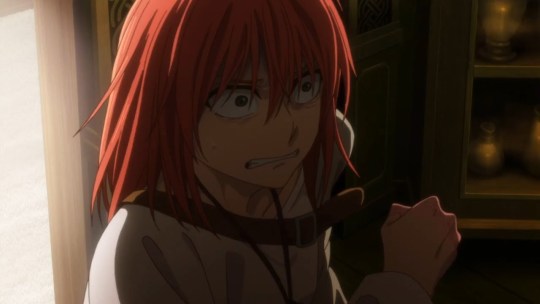
I fully expected this to be how the anime ends. With Elias and Chise seperating and the promise that they will both be able to grow and change and learn to be without each other. And probably a hint that they’d reunite eventually, when Elias has truly changed (not just SAID he will). It seemed to be the natural arc of the narrative and honestly what these two characters NEEDED to really progress.
But the anime said “fuck character development, fuck healthy relationships, fuck pacing, fuck everything” and threw the arc it had been carefully building out the window.
In an extremely rushed and jarring final epsiode, Chise does a dangerous thing and asks for Elias’s help and he complies and...thus she instantly forgives him. Despite the whole thing being treated as a huge deal, suddenly this very real issue of their toxic relationship is forgotten, she goes back to him and their disagreement is treated as nothing more than a cute spat (with Elias claiming Chise is equally at fault because she acted on her own without waiting for him once, proving he has learned NOTHING and does not understand the severity of what he did and how it is in no way equivalent to Chise simply being reckless), they even turn chibi.
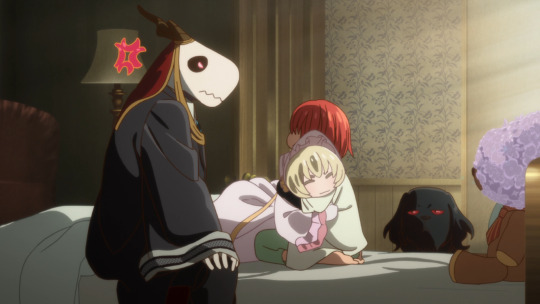
THIS IS AN ARGUMENT OVER HOW ELIAS TRIED TO MURDER A CHILD CHISE LIKED OUT OF PETTY JEALOUSY. IT’S A BIG DEAL. DON’T TRY TO MAKE IT SOME CUTE AND SILLY THING WHEN YOU TREATED IT SERIOUSLY THREE EPISODES AGO.
Oh, but it gets worse. Elias and Chise resolve their argument offscreen and apparently it’s all solved by Elias saying he won’t do it again. Yep. That’s it. No demonstration he’s changed or even understands why his actions are wrong. It’s just “I won’t do things you don’t like”. Problem solved!
And the Chise does what any girl would do after a guy broke her heart and tried to murder her ten year old friend: get a wedding dress and make her vows to him!
No. i’m not joking. As much as I wish it was.
And this scene is not framed as creepy or dangerous. It is framed as sweet and romantic.

Let’s put aside the fact Chise is 16. Let’s put aside the huge power imbalance in their relationship and the fact Chise is in his care. Even putting those things, this makes no sense from a narrative and characterization perspective
Elias has done nothing to warrant Chise wanting the make this step! He literally just betrayed her! There was absolutely no buildup to this, no natural relationship progression! Elias and Chise are both in no way ready to be in a romantic relationship! Elias proved he isn’t emotionally equipped to function as FRIEND and reasonable being right now, much less a husband! Does he even know what a bride is? Last time we checked, he didn’t even understand the concept fully! He has no idea what he’s supposed to do as a husband. Why would Chise choose NOW of all times to make her move when he’s done nothing to show her he won’t pull shit like, i dunno, trying to murder her friends because he’s jealous, again?
This is so tonally jarring with the rest of the series and it comes out of nowhere. It seemed fundamentally opposed to how the relationship between Chise and her mom was handled, where moving away from abuse and letting go of your abuser was emphasized. Where not excusing horrible actions and taking time to fully deal with your hurt and pain was emphasized. Apparently none of that applies to Elias! No time apart, no time to process and heal and have him take responsibility for his actions!
It’s also just terrible from a narrative perspective- it’s ridiculously rushed, it’s a complete tone shift that treats what was presented as a big dramatic conflict that seemed like it would shake these characters at their foundation as a an easily resolved cute little spat, it fails to be satisfying as a conclusion. Compared to the rest of the show, it feels like it was written by an entirely different person.

And it was. I immediately went to check if this whole conclusion was anime original and yep. This is where it overtook the manga. This ep was the shitty, rushed conclusion they tacked on to a story line that really, really needed more time to breathe. I have no idea why they’d want to do this, why they couldn’t just wait for the manga to finish this arc and end the anime there, but here we are.
I hope the manga will have a more satisfying conclusion to this storyline, that it will give the resolution the room it needs. Ideally, I’d like Chise to live apart from Elias for at least a while. She’s grown a lot, and she needs space to grow further and learn how to function without him. They’ve gotten dangerously codependent and it’s stifling her. Meanwhile, Elias especially needs to learn how to not treat Chise so possessively and taking time apart from her and respecting her wishes to be left alone would help him learn to do that. He needs to work on himself so he isn’t a danger to her. If they stay together right now, things will only get worse.
The manga is about their relationship, so I have no doubt they’ll eventually reunite, but I want to see it happen only after Elias proves he’s changed significantly and after Chise is allowed to become more confident and independent. I hope the manga delivers on that and tells a satisfying story where the characters actually grow, that treats the issue of abuse and toxic relationships seriously, that gels with the stuff that came before.
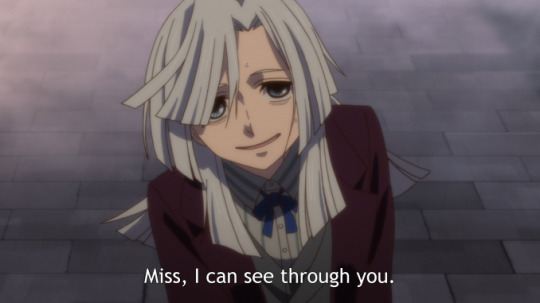
Of course, there was other stuff going on in the midst of Chise and Elias’ emotional journeys. We learned the Cartaphilus backstory and it was actually pretty interesting stuff. it fully explored exactly how horrific it would be to wander the earth and never die- Cartaphilus was being punished for a crime that was so long ago he couldn’t even remember what it was. When he finds out it was “threw a rock at the Son of God” he’s like “wtf just for that? other people did way worse shit!” and you have to agree with him. It also offers the ishiness of using Cartaphilus as an antagonist a bit by making it clear he only started killing after fusing with a boy named Joseph. In fact, the Cartaphilus part of Joseph seems mostly benign as he was the one who tried to talk to Chise.
So it’s a compelling take on an old story. Lots of parallels are made between him and Chise, he’s a great antagonist thematically. The conclusion...well like everything in the last episode, it was rushed, weird, and I couldn’t really tell what was going on. Hopefully the manga's version will be better.

I enjoyed a lot of this anime- the rich fantasy world, the exploration of trauma, the complex characters- but the last episode was just so infuriatingly BAD that it damaged the narrative as whole. It undid and contradicted most of the positive things about the story. It just left me feeling skeeved out.
So in the end, I don’t recommend this anime. Because you’re better off reading the manga. I went through it, and it was better paced than the anime overall, has many details that strengthen the story and the emotional beats hit much harder. Watching the anime can be a confusing experience at times, but the manga is much easier to follow. I feel pretty confident based off this that however the manga wraps up the current arc, it will at the very least be slightly better paced and executed. So be kind to yourself, and go with the better version of the story if you’re interested in this. And cross your fingers for a good ending.
#anime overview#the ancient magus bride#devilman crybaby#winter 2018 anime#mahou tsukai no yome#mahoutsukai no yome#hatori chise#chise hatori#elias ainsworth#anime#abuse cw#suicide cw
49 notes
·
View notes